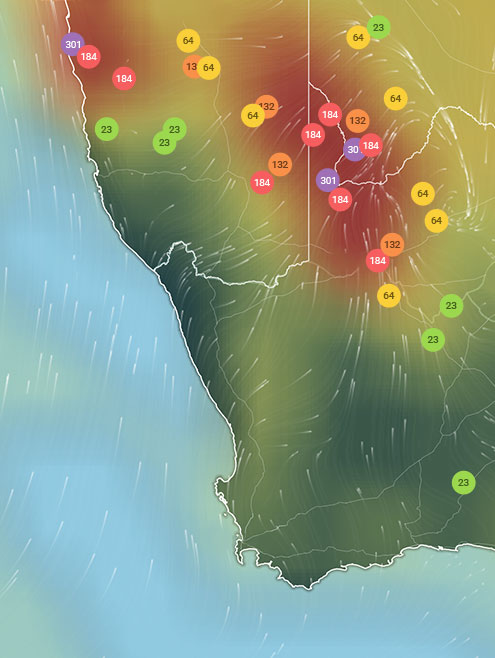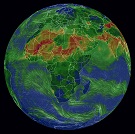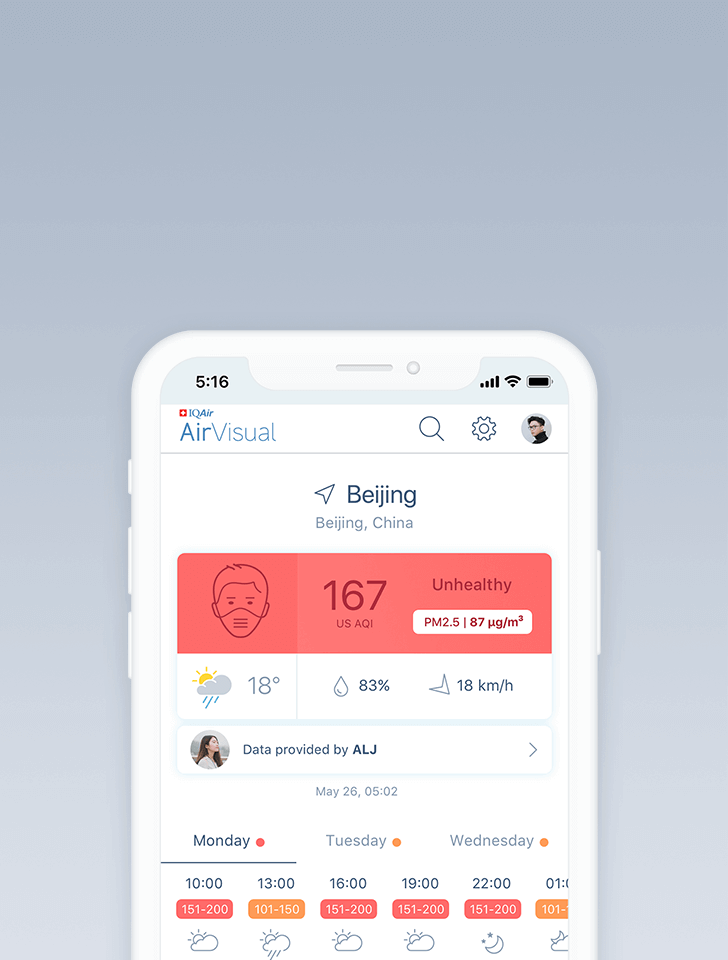Air quality in Zibo
Air quality index (AQI) and PM2.5 air pollution in Zibo
15.5K people follow this city

Zibo Air Quality Map
Real-time Zibo air pollution map
Weather
What is the current weather in Zibo?
| Weather | Clear sky |
| Temperature | 75.2°F |
| Humidity | 30% |
| Wind | 10.7 mp/h |
| Pressure | 29.7 Hg |
live aqi city ranking
Real-time China city ranking
| # | city | US AQI |
|---|---|---|
| 1 | Wuhan, Hubei | 160 |
| 2 | Xixiang, Henan | 160 |
| 3 | Yangcun, Tianjin | 156 |
| 4 | Wuda, Inner Mongolia | 153 |
| 5 | Huanggang, Hubei | 152 |
| 6 | Tongzhou, Beijing | 152 |
| 7 | Caidian, Hubei | 149 |
| 8 | Changping, Beijing | 149 |
| 9 | Tangshan, Hebei | 146 |
| 10 | Tangjiazhuang, Hebei | 145 |
(local time)
SEE WORLD AQI RANKING3D animated air pollution map

live Zibo aqi ranking
Real-time Zibo air quality ranking
| # | station | US AQI |
|---|---|---|
| 1 | Weather station | 112 |
| 2 | People's Park | 82 |
| 3 | Putian yuan | 76 |
| 4 | Shuangshan | 70 |
(local time)
SEE WORLD AQI RANKINGUS AQI
79
live AQI index
Moderate
Overview
What is the current air quality in Zibo?
| Air pollution level | Air quality index | Main pollutant |
|---|---|---|
| Moderate | 79 US AQI | PM2.5 |
| Pollutants | Concentration | |
|---|---|---|
| PM2.5 | 25.5µg/m³ | |
| PM10 | 92.5µg/m³ | |
| O3 | 173µg/m³ | |
| NO2 | 13µg/m³ | |
| SO2 | 12µg/m³ | |
| CO | 400µg/m³ | |
PM2.5
x5.1
PM2.5 concentration in Zibo is currently 5.1 times the WHO annual air quality guideline value
Health Recommendations
What is the current air quality in Zibo?
| Sensitive groups should reduce outdoor exercise | |
| Close your windows to avoid dirty outdoor air GET A MONITOR | |
| Sensitive groups should wear a mask outdoors GET A MASK | |
| Sensitive groups should run an air purifier GET AN AIR PURIFIER |
Forecast
Zibo air quality index (AQI) forecast
| Day | Pollution level | Weather | Temperature | Wind |
|---|---|---|---|---|
| Monday, Apr 22 | Unhealthy for sensitive groups 142 AQI US | 78.8° 53.6° | ||
| Tuesday, Apr 23 | Moderate 79 AQI US | 60.8° 50° | ||
| Wednesday, Apr 24 | Moderate 88 AQI US | 77° 48.2° | ||
| Today | Moderate 79 AQI US | 80.6° 55.4° | ||
| Friday, Apr 26 | Moderate 79 AQI US | 80.6° 55.4° | ||
| Saturday, Apr 27 | Moderate 60 AQI US | 78.8° 55.4° | ||
| Sunday, Apr 28 | Moderate 68 AQI US | 68° 53.6° | ||
| Monday, Apr 29 | Moderate 77 AQI US | 69.8° 59° | ||
| Tuesday, Apr 30 | Moderate 61 AQI US | 57.2° 50° | ||
| Wednesday, May 1 | Moderate 66 AQI US | 75.2° 48.2° |
Interested in hourly forecast? Get the app
AIR QUALITY ANALYSIS AND STATISTICS FOR Zibo
How polluted is the air in Zibo?
Zibo is a prefecture-level city in central Shandong province, China and administers eight divisions, five districts and three counties. According to the 2010 census, Zibo's population was 4.53 million, of which 4.41 million lived in the metro area. One of its key industries is the manufacture of ceramics. Other industries that process materials here are the petrochemical industry, pharmaceuticals, metallurgy, construction materials, machinery and textiles.
In the second quarter of 2021, Zibo was experiencing a period of “Unhealthy” air with a US AQI reading of 155. This “United States Air Quality Index” figure follows the guidelines suggested by the World Health Organisation (WHO). Six pollutants are usually measured and used as a benchmark in the determination as to how polluted the environment is. The recorded levels of these six pollutants were as follows: PM2.5 - 64 µg/m³, PM10 - 146.5 µg/m³, ozone (O3) - 99 µg/m³, nitrogen dioxide (NO2) - 52.5 µg/m³, sulphur dioxide (SO2) - 19.5 µg/m³ and carbon monoxide (CO) - 1000 µg/m³. It is advisable to take precautions when levels are this high, especially for those who are sensitive to poor air quality. They need to avoid venturing outside until the quality improves and close doors and windows to prevent more dirty air from entering their homes.
Does the level of air pollution differ throughout the year?
Because of the volatile nature of air pollution and the fact it can be influenced by many factors, it comes as no surprise that air quality can change within a day.
Looking at the latest figures for 2020 released on the IQAir website it can be seen that the period of the poorest quality air is during the winter months from November through to the end of February. The level recorded in 2020 was “Unhealthy” with figures between 55.5 and 150.4 µg/m³. August was shown to be the best month with “Moderate” air quality and a reading of 31.8 µg/m³. The remaining months were classed as being “Unhealthy for sensitive groups” with figures between 35.5 and 55.4 µg/m³.
Records were started back in 2017 when Zibo’s air was unhealthy at 63.1 µg/m³. It has shown signs of improvement since then. In 2018 the figure was 55.9 µg/m³ followed by a slight increase to 57.7 µg/m³ in 2019. In 2020 the annual average was 53.9 µg/m³ which showed a marked improvement. This 2020 figure could be affected by the COVID-19 pandemic when vehicle movement and some industry was restricted.
What are the sources of polluted air in Zibo?
As with many large industrial cities anywhere in the world, most pollution comes from emissions from vehicles and factories and power stations. Open burning of organic waste and dust generated by the movement of people and vehicles over the dry ground.
More than 50 types of mineral reserves can be found in the surrounding area. These include coal, iron, bauxite, coal clay, chemical limestone and pottery clay. The northern areas of Zibo are also rich in petroleum deposits. The extraction and transportation of all of these contribute to the polluted environment.
What can be done to reduce the effects of air pollution in Zibo?
When the local authorities predict a change for the worse in air quality, certain procedures are to be implemented.
Dust pollution reduction measures include stopping open-air operations in mines, sand and gravel yards, stone factories/quarries, slate factories, etc. Construction sites are prohibited from earth and stone work, building demolition, spray painting, concrete mixing, etc. and slag transportation will stop.
Transportation vehicles such as coal, sand and gravel materials that are prone to spillage are prohibited from being transported on the main roads, and road sections that are prone to dust are cleaned and watered more frequently.
With the exception of vehicles performing special tasks, heavy and medium diesel trucks, three-wheeled vehicles, low-speed trucks and tractors are prohibited from travelling into the main urban areas of cities and counties.
As of March 2021, the local government set plans in motion to monitor the furnaces and kilns within the city limits. The main goals were to focus on the whole process of the renovation of the industrial kilns and furnaces. It is the intention to use the latest technology to treat the emissions so they no longer pollute the environment. Concentrate on the construction of ceramics industrial parks, refractory materials industrial parks and daily glass industrial parks to increase the concentration of enterprises in the parks and enhance the level of intensification. At the same time, the energy structure has also been adjusted, and the remaining industries such as ceramics, refractory materials and cement grinding stations have all been converted to natural gas as fuel. From the original 23,000 industrial enterprises, 9,500 have been closed down and over 13,000 were comprehensively renovated.
Which groups of people are most likely to suffer because of Zibo’s poor quality air?
Those most susceptible to severe health problems from air pollution are individuals who already suffer from heart disease, coronary artery disease or congestive heart failure. Those with pre-existing lung diseases such as asthma, emphysema or chronic obstructive pulmonary disease (COPD). Add to these, pregnant women, children under the age of 14 years due to their immaturity, senior citizens and the elderly, those whose jobs place them outside for several hours each day and even athletes who exercise regime takes them outside for longer periods of time.
Ground-level ozone is a common pollutant and is particularly nasty. It is a strong irritant that can cause constriction in the airways thus forcing the heart and lungs to work so much harder in order to supply the body with the desired amount of oxygen. This leads to increased fatigue, reduced resistance to infections and compromised athletic performances.
Particulate Matter (PM2.5 and PM10) is a complex mixture that may contain soot, smoke, metals, nitrates, sulphates, dust, water and tyre rubber.
Prolonged exposure to particulate matter can lead to significant health problems such as increased respiratory symptoms, such as irritation of the airways, coughing or difficulty breathing. Existing asthma sufferers will be prone to more frequent attacks and it can lead to the development of chronic respiratory disease in children and chronic bronchitis or chronic obstructive lung disease in adults.





